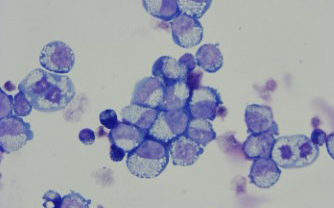Major breakthrough in the manufacture of red blood cells
24th March 2017
Researchers have generated the first immortalised cell lines which allow more efficient manufacture of red blood cells.
The team, from the University of Bristol and NHS Blood and Transplant, were able to manufacture red blood cells in a more efficient scale than was previously possible.
The results, published in Nature Communications, could, if successfully tested in clinical trials, eventually lead to a safe source of transfusions for people with rare blood types, and in areas of the world where blood supplies are inadequate or unsafe.

Previously, research in this field focused on growing donated stem cells straight into mature red blood cells. However that method presently produces small numbers of mature cells and requires repeat donations.
The world-leading team in Bristol have now developed a robust and reproducible technique which allows the production of immortalised erythroid cell lines from adult stem cells. These premature red cells can be cultured indefinitely, allowing larger-scale production, before being differentiated into mature red blood cells.
Dr Jan Frayne, from The University of Bristol School of Biochemistry, said: "Previous approaches to producing red blood cells have relied on various sources of stem cells which can only presently produce very limited quantities. By taking an alternative approach we have generated the first human immortalised adult erythroid line (Bristol Erythroid Line Adult or BEL-A), and in doing so, have demonstrated a feasible way to sustainably manufacture red cells for clinical use from in vitro culture.
"Globally, there is a need for an alternative red cell product. Cultured red blood cells have advantages over donor blood, such as reduced risk of infectious disease transmission."
Prof Dave Anstee, Director at the NIHR Blood and Transplant Research Unit in Red Cell Products, which is a collaboration between the University of Bristol and NHS Blood and Transplant, said: "Scientists have been working for years on how to manufacture red blood cells to offer an alternative to donated blood to treat patients.
"The first therapeutic use of a cultured red cell product is likely to be for patients with rare blood groups because suitable conventional red blood cell donations can be difficult to source.
"The patients who stand to potentially benefit most are those with complex and life-limiting conditions like sickle cell disease and thalassemia, which can require multiple transfusions of well matched blood. The intention is not to replace blood donation but provide specialist treatment for specific patient groups.
The cells were cultured at the University of Bristol and at NHS Blood and Transplant`s Filton site.
NHS Blood and Transplant needs to collect 1.5 million units of blood each year to meet the needs of patients across England and the ongoing need for life saving blood donations remains. It would be many years before manufactured cells could be available on a large scale.
NHS Blood and Transplant announced plans for in-man trials of manufactured blood in 2015. This first trial will not use Bel-A cells. The first trial, due to start by the end of 2017, will use manufactured red cells from stem cells in a normal blood donation.
- The research was funded by The Department of Health, The Wellcome Trust, NHS Blood and Transplant, BrisSynBio via a BBSRC/EPSRC Synthetic Biology Research Centre Grant, National Institute for Health Research Blood and Transplant Unit (NIHR BTRU) in Red Blood Cell Products at the University of Bristol in Partnership with NHS Blood and Transplant (NHSBT).
- The research is available to view online
- Photo captions: Continuously expanding cells - images of the immortalised early erythroid cells, labelled with number of days since immortalisation, demonstrating no change in morphology of the cells with extended time in continuous culture.
For additional information please contact
- For further information or to arrange an interview with one of the researchers at NHS Blood and Transplant, contact Stephen Bailey on 0151 268 7017 or via stephen.bailey@nhsbt.nhs.uk or contact the NHS Blood and Transplant Press Office on 01923 367600 or via pressoffice@nhsbt.nhs.uk
- For further information or to arrange an interview with one of the researchers at the University of Bristol, contact Caroline Clancy on 0117 331 7276 or via caroline.clancy@bristol.ac.uk or contact the University of Bristol press office on 0117 928 8895 or via press-office@bristol.ac.uk
Note to editors
- NHS Blood and Transplant is a joint England and Wales Special Health Authority. We are responsible for ensuring a safe and efficient supply of blood and associated services to the NHS in England. We are also the organ donation organisation for the UK and are responsible for matching and allocating donated organs.
- NHS Blood and Transplant has a Research and Development strategy which includes funding and carrying out world leading research, clinical trials and studies.
- NHS Blood and Transplant needs to collect 1.5 million units of blood each year to meet the needs of patients across England. Blood donors can search for sessions, book appointments, change/cancel their appointments and change their contact details in real time at www.blood.co.uk
- The University of Bristol is one of the most popular and successful universities in the UK. It was ranked within the top 50 universities in the world in the QS World University Rankings 2016. The University of Bristol is ranked among the top five institutions in the UK for its research, according to new analysis of the Research Excellence Framework (REF) 2014, and is the 3rd most targeted university by top UK employers.
- Bristol is a member of the Russell Group of UK research-intensive universities, and a member of the Worldwide Universities Network, a grouping of research-led institutions of international standing.
- The University was founded in 1876 and was granted its Royal Charter in 1909. It was the first university in England to admit women on the same basis as men.